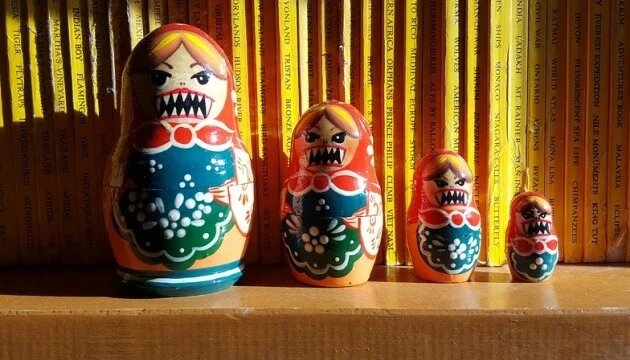Leaflet was originally developed and published within the project Sharethetruths.org, supported by Heinrich Boell Foundation.

1. The soviet nostalgia
For years Russia has been reminiscing about its past glory of the World War II victory. The patriotic films, art, music and literature cemented the glorified narrative in Russian society. At the same time it has been promoting a culture of justified violence and cruelty against unknown. Joseph Stalin is remembered in Russia as one of the most prominent personalities of the 20th century. Though Russian culture camouflages his responsibility for Holodomor— a genocide against Ukrainians—as just a tragedy of the Soviet people as a whole. George Orwell, British author of the dystopian novel 1984 and the satirical novel Animal Farm, was critical of those who sympathized with the Soviet Union. ‘Huge events like the Ukrainian Famine of 1933, involving the deaths of millions of people, have actually escaped the attention of the majority of English Russophiles’. Are you aware of any Russian books or films about Holodomor?
2. The imperialist complex
Putin is convinced that Russia’s status as a global power depended on its expansive empire. Vast sums of money and lives of young Russian soldiers to maintain imperial glory from the battlefield to the exhibition halls. Among such examples is Russian avant-garde. It is rarely mentioned about the Ukrainian, Jewish, Georgian and Belarusian origins of such great modernist painters like Chagall, Malevich, Zdanevich and others. The Russian curators are stone-deaf to their national identity and it has a huge influence on the art world. Now imagine the British modernist art exhibition without mentioning the artists’ origins, like from Scotland, Wales, Ireland or distant colonies and call it simply ‘English Modernist Art’?
3. Cultural diplomacy
Russian ballet, theatre, classical music and literature have well integrated into theatres, cinemas, and bookshelves to divert the world’s attention from the crimes against humanity and wars conflicts initiated by Russians. Russian films screened at the International film festivals present critical films about Russian autocracy, often financed by the Russian government. They often help to create the illusion of democracy and freedom in the state. Meanwhile, an average Russian TV viewer watches films with the opposite propagandist message. As usual, these films present a distorted version of reality and history like the drama ‘Crimea’. It is the absolute false interpretation of the Revolution of Dignity and Crimea annexation.
4. Good Russians
There is a common message circulating that it is Putin and the political class who are responsible for the war in Ukraine. Sanctions and cancel culture should not affect those beyond the circle, as society has nothing to do with that. One of such “good Russicans” is film director Kirill Serebrennikov. He was the main Kremlin prisoner until his release a few days after the start of the Russian war in Ukraine. Now he is considered an oppositional director and shelters in France. If he would be oppositional then he would revoke his movie from the Festival de Cannes Programme as a protest against Russian war in Ukraine.
5. The peacemakers
Russia justifies its “special operations” in Transnistria, Abkhazia, Chechnya or Syria as peacekeeping missions or support to the oppressed ones. In the case of Ukraine, it is the protection of the Russian speaking population as well as preventing genocide in Donbas. But it's not only politicians or the military who are in charge of spreading the propaganda, but also culture representatives. On April 12, the musical-patriotic marathon ‘For Russia (Za Россию)’ started in support of the military participating in a “special operation” in Ukraine. Now Russian cultural ‘peacemakers’ officially fundraise to provide Russian army with missiles and bombs to kill Ukrainians. The tour includes nearly 30 Russian cities and most of the singers are far from any sanctions. One day they may sing not only in Russian cities.